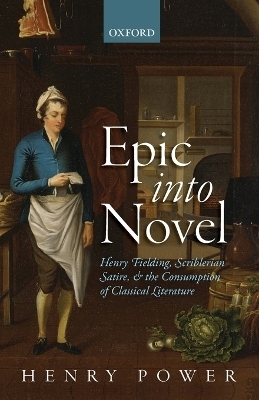
Epic into Novel
Henry Fielding, Scriblerian Satire, and the Consumption of Classical Literature
Seiten
2019
Oxford University Press (Verlag)
978-0-19-883396-3 (ISBN)
Oxford University Press (Verlag)
978-0-19-883396-3 (ISBN)
Epic into Novel examines the work of Henry Fielding alongside other key eighteenth-century writers to examine how the conflicting influences of the classical tradition and the new literary marketplace were reconciled.
Epic into Novel examines an unexplored tension in Fielding's work: the tension between his commitment to the classical tradition and his immersion in a print culture in which books were regarded as consumable commodities. It gives a fresh account of Fielding's engagement with classical literature, showing how he fashioned his novels out of ancient epic. It also shows how Fielding drew on the language of cookery and consumption in order to characterize his relationship with the market.
This interest in the place of the ancients in a world of consumerism was inherited from the previous generation of satirists. The 'Scriblerians'--among them Jonathan Swift, John Gay, and Alexander Pope--repeatedly suggest in their work that classical values are at odds with modern tastes and appetites. Fielding, who had idolized these writers as a young man, developed many of their satiric routines in his own writing. But Fielding broke from Swift, Gay, and Pope in creating a version of epic designed to appeal to modern consumers.
Henry Power draws on a range of sources--including eighteenth-century cookery books as well as works of classical literature--to offer fresh readings of works by Swift, Gay, and Pope, and of Fielding's major novels. Epic into Novel explores Fielding's engagement with various Scriblerian themes, primarily the consumption of literature, but also the professionalization of scholarship, and the status of the author. It shows ultimately that Fielding broke with the Scriblerians in acknowledging and celebrating the influence of the marketplace on his work.
Epic into Novel examines an unexplored tension in Fielding's work: the tension between his commitment to the classical tradition and his immersion in a print culture in which books were regarded as consumable commodities. It gives a fresh account of Fielding's engagement with classical literature, showing how he fashioned his novels out of ancient epic. It also shows how Fielding drew on the language of cookery and consumption in order to characterize his relationship with the market.
This interest in the place of the ancients in a world of consumerism was inherited from the previous generation of satirists. The 'Scriblerians'--among them Jonathan Swift, John Gay, and Alexander Pope--repeatedly suggest in their work that classical values are at odds with modern tastes and appetites. Fielding, who had idolized these writers as a young man, developed many of their satiric routines in his own writing. But Fielding broke from Swift, Gay, and Pope in creating a version of epic designed to appeal to modern consumers.
Henry Power draws on a range of sources--including eighteenth-century cookery books as well as works of classical literature--to offer fresh readings of works by Swift, Gay, and Pope, and of Fielding's major novels. Epic into Novel explores Fielding's engagement with various Scriblerian themes, primarily the consumption of literature, but also the professionalization of scholarship, and the status of the author. It shows ultimately that Fielding broke with the Scriblerians in acknowledging and celebrating the influence of the marketplace on his work.
Henry Power is Professor of English at the University of Exeter.
Introduction: 'Modern Dinners'
1: 'Mackarel a Week after the Season': Swift and the Durability of Epic
2: John Gay's Art of Walking the Streets
3: Alexander Pope: 'Fragments, not a Meal'
4: Joseph Andrews: 'The Sanction of Great Antiquity'
5: Tom Jones I: 'The Cookery of the Author'
6: Tom Jones II: Fielding's Sagacious Reader
6: Amelia: 'Talk not to me of Dinners'
| Erscheinungsdatum | 22.01.2020 |
|---|---|
| Zusatzinfo | 3 black-and-white halftones |
| Verlagsort | Oxford |
| Sprache | englisch |
| Maße | 140 x 216 mm |
| Gewicht | 318 g |
| Themenwelt | Geschichte ► Allgemeine Geschichte ► Neuzeit (bis 1918) |
| Geisteswissenschaften ► Sprach- / Literaturwissenschaft ► Anglistik / Amerikanistik | |
| Geisteswissenschaften ► Sprach- / Literaturwissenschaft ► Literaturwissenschaft | |
| ISBN-10 | 0-19-883396-2 / 0198833962 |
| ISBN-13 | 978-0-19-883396-3 / 9780198833963 |
| Zustand | Neuware |
| Haben Sie eine Frage zum Produkt? |
Mehr entdecken
aus dem Bereich
aus dem Bereich
Europa 1848/49 und der Kampf für eine neue Welt
Buch | Hardcover (2023)
DVA (Verlag)
CHF 67,20
Giordano Bruno - ein ketzerisches Leben
Buch | Hardcover (2024)
C.H.Beck (Verlag)
CHF 41,85


